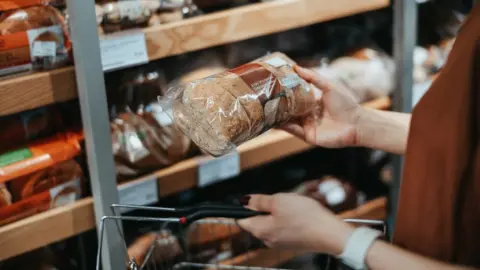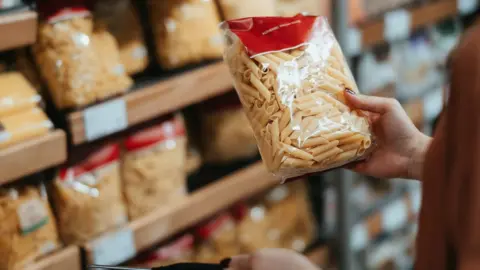Cost of Living: NI woman with coeliac disease says food bill has doubled
 Getty Images
Getty ImagesA woman living with an autoimmune disease which means she has to eat specialist foods says the price of her weekly food shop has doubled.
Collette Cassin, from Lisburn, has coeliac disease.
The NHS says the condition is caused by the immune system attacking and damaging your gut when you eat food containing gluten. It is managed by eating a gluten-free diet.
Some gluten free produce is available on prescription.
However, many coeliacs feel this scheme is quite limited and means they can't buy food at short notice.
Ms Cassin said the cost of gluten-free food has been consistently high for more than a decade but inflation means prices have risen considerably.
"My grocery bill is significantly higher than normal. Simple things - like gluten-free Bisto is two or three times more than regular Bisto," she explained.
"You can spend up to £3.40 for a loaf of bread."
Gluten-free flour, she explained, "is a lot more expensive than ordinary flour".
'Sometimes I put food back'
Miss Cassin said she found that gluten-free frozen food, such as fish, had gone up so much that sometimes she now doesn't buy it, adding: " And I just don't bother with pastries".
"A shop that would've cost me £50/60 - now I'm hitting the £100 mark, and that's for a week's shopping."
Miss Cassin's daughter is not coeliac, meaning she needs to buy different food.
"With a family, you have to buy two lots of food, which can mean a struggle for a lot of people," she said.
"If you're living on a low income it is challenging."
The Consumer Council has spoken to 1,000 people who work in the health sector, have a hypersensitivity or buy 'free-from' products for lifestyle and health reasons, or due to environmental concerns.
It said more than 40% of these consumers had to go without because an item was too expensive.
Buying in bulk
Philippa McKeown-Brown from the Consumer Council said value for money is a big issue.
"Very often items are in smaller pack sizes but they're more expensive than their standard equivalent. That's having a knock-on effect," she said.
"People are having to buy in greater quantity or in bulk, which means having that money upfront, which can be harder for lower income consumers."
For others, Ms McKeown-Brown said getting hold of specific products can be a challenge.
 Getty Images
Getty ImagesDue to supply-chain issues associated with Covid and the war in Ukraine people who rely on free-from foods "were seeing people buying gluten-free pasta because their own pasta wasn't available", which caused a lot of anxiety and concern, Ms McKeown-Brown said.
"With the EU exit there are also some product ranges that our participants are telling us are no longer available and that seems to be having a more long-lasting effect so some of the issues have gone away, due to supply, but now they're seeing perhaps product lines being withdrawn."
Katie Hunter, a public health dietitian from the Belfast Health and Social Care Trust and member of the British Dietetic Association said there can be serious ramifications on a person's dietary health if they are prevented from purchasing free-from foods.
"Either they will make a decision to eat foods they have an intolerance to, which will cause ill health, or they could opt to leave out large parts of their diet," she added.
